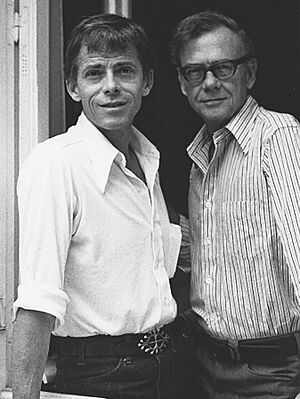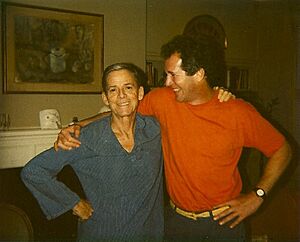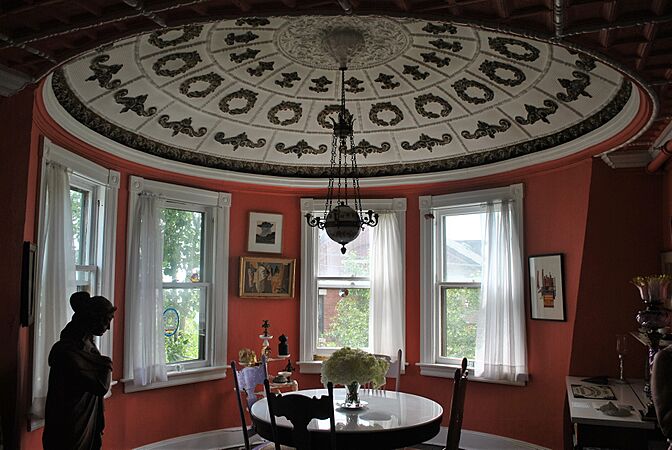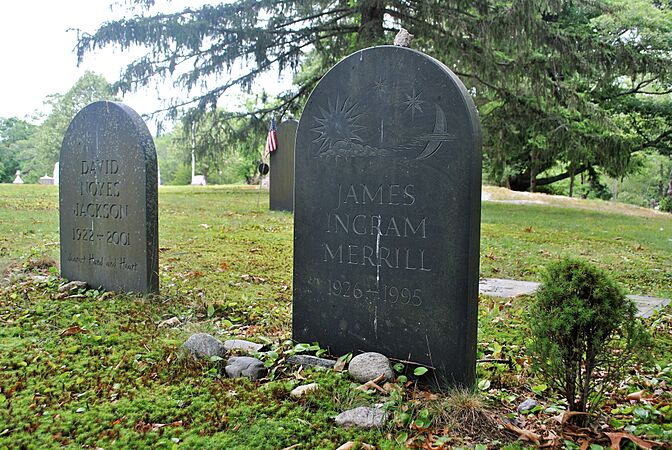James Merrill facts for kids
Quick facts for kids
James Merrill
|
|
|---|---|

Merrill in 1973
|
|
| Born | James Ingram Merrill March 3, 1926 New York City, US |
| Died | February 6, 1995 (aged 68) Tucson, Arizona, US |
| Occupation | Poet |
| Education | Amherst College (BA) |
| Genre | American poetry |
| Notable works | The Changing Light at Sandover, Divine Comedies, Nights and Days |
| Notable awards | Pulitzer Prize for Poetry, National Book Award, Bollingen Prize |
| Partner | David Jackson Peter Hooten |
| Parents | Charles E. Merrill (father) |
| Relatives | Charles E. Merrill, Jr. (brother) Peter Magowan (nephew) |
James Ingram Merrill (born March 3, 1926 – died February 6, 1995) was a famous American poet. He won the Pulitzer Prize for poetry in 1977 for his book Divine Comedies.
Merrill's poems changed over time. Early in his career, he wrote very formal and structured poems. Later, he became known for a long, epic story poem called The Changing Light at Sandover. This huge work was published in three parts from 1976 to 1980. Besides poetry, he also wrote essays, short stories, and plays.
Contents
Growing Up: James Merrill's Early Life
James Ingram Merrill was born in New York City in 1926. His father, Charles E. Merrill, helped start the well-known investment company, Merrill Lynch. His mother, Hellen Ingram Merrill, was a society reporter.
James grew up in a very wealthy family. For example, his father owned a large estate in Southampton, New York, called "The Orchard." This property had beautiful gardens designed by famous landscape artist Frederick Law Olmsted.
His childhood governess taught him French and German. Merrill later wrote about this experience in his 1974 poem Lost in Translation. From 1936 to 1938, he went to St. Bernard's, a top grammar school in New York.
Merrill found it hard to understand his parents' busy lives. He felt more connected to nature, animals, and the household staff. He saw their lives as more meaningful. His parents separated when he was eleven and divorced when he was thirteen.
As a teenager, James attended the Lawrenceville School. There, he started writing poetry and became friends with future novelist Frederick Buechner. When Merrill was 16, his father secretly collected his early stories and poems. He published them as a surprise book called Jim's Book. Merrill was happy at first, but later felt a bit embarrassed by it. Today, this early book is very valuable.
Becoming a Poet: The Black Swan
In 1944, Merrill joined the United States Army and served for eight months. After his military service, he returned to Amherst College in 1945. He graduated with top honors in 1947.
His senior paper on French novelist Marcel Proust showed his great writing talent. His English professor even told the graduating class that James was "destined for some sort of greatness."
The Black Swan, a collection of Merrill's poems, was privately published in Greece in 1946. Only one hundred copies were made when Merrill was just 20 years old. This book is now one of his rarest works. His first book sold to the public was First Poems, released in 1951.
His Life and Friendships
James Merrill's companion for thirty years was David Noyes Jackson, who was a writer and artist. They met in New York City in 1953. In 1955, Merrill and Jackson moved to Stonington, Connecticut. Their home there is now a special place for writers to stay.
For many years, they spent winters in Athens, Greece. Greek places and characters often appear in Merrill's writing. Later, they also spent part of each year in Key West, Florida.
In his 1993 memoir A Different Person, Merrill shared that he struggled with writer's block early in his career. He sought help to overcome this challenge. He wrote about finding freedom in his writing. In his memoir, he also openly described his friendships and relationships with several men, including David Jackson and his later companion, actor Peter Hooten.
Helping Other Artists: The Ingram Merrill Foundation
James Merrill was known for his many friendships. He was called "Jimmy" by his friends and family throughout his life. Even though he came from a very wealthy family, Merrill lived a simple life. He and his siblings gave up their right to inherit more money from their father's estate. This allowed most of his father's money to be given to charity.
Merrill himself was a generous person. In the 1950s, he started the Ingram Merrill Foundation. This foundation helped support literature, the arts, and public television. It often gave money to young writers and artists who were just starting out. Merrill helped many writers financially, sometimes without them even knowing it.
Merrill served as a leader for the Academy of American Poets from 1979 until his death. He passed away on February 6, 1995, in Arizona due to health issues. His ashes and those of David Jackson are buried together in Stonington.
James Merrill's Awards
James Merrill received many important poetry awards in the United States. His first award was the Glascock Prize for The Black Swan when he was still in college.
He won the 1977 Pulitzer Prize for Poetry for his book Divine Comedies. In 1973, he was honored with the Bollingen Prize.
Merrill also received the National Book Critics Circle Award in 1983 for his long poem The Changing Light at Sandover. This poem was partly inspired by messages he believed he received from spirits using a Ouija board. In 1990, he won the first Bobbitt National Prize for Poetry for The Inner Room. He won the National Book Award for Poetry twice: in 1967 for Nights and Days and in 1979 for Mirabell: Books of Number.
In 1978, he became a member of the American Academy of Arts and Sciences. In 1991, he received the Golden Plate Award from the American Academy of Achievement.
His Unique Writing Style
Merrill was a very elegant and clever writer. He was great at wordplay and puns. He was a master of traditional poetry forms and rhythm. However, he also wrote a lot of free and blank verse poetry, which doesn't follow strict rules.
Even though he wasn't a "confessional" poet (one who writes openly about personal feelings), Merrill often used his own relationships in his poems. He called his work "chronicles of love & loss." His parents' divorce, and the feeling of seeing the world in two different ways, was a big theme in his poems. He sometimes changed small details from his own life to make a poem better.
As Merrill got older, his writing became more informal and conversational. In the 1970s, he started including messages from what he believed were spirits in his work. This led to his 560-page epic poem, The Changing Light at Sandover (published in 1982). This huge poem tells the story of two decades of messages he and David Jackson received during Ouija séances.
The Changing Light at Sandover is one of the longest epic poems ever written. It features voices of famous people who had passed away, like poet W. H. Auden, and even heavenly beings like the Archangel Michael. Merrill explained that channeling voices through a Ouija board made him think differently about imagination.
After The Changing Light at Sandover, Merrill returned to writing shorter poems. These later poems could be both funny and thoughtful. For example, "Self-Portrait in TYVEK Windbreaker" is a poem inspired by a jacket he bought. The jacket was made of a special material called Tyvek, used for mail envelopes, and had a world map on it.
Works by James Merrill
After his death, Merrill's writings were collected into three main groups: Collected Poems, Collected Prose, and Collected Novels and Plays.
Poetry Collections
- The Black Swan (1946)
- First Poems (1951)
- The Country of a Thousand Years of Peace (1959)
- Water Street (1962)
- Nights and Days (1966)
- The Fire Screen (1969)
- Braving the Elements (1972)
- The Yellow Pages (1974)
- Divine Comedies (1976), which includes "Lost in Translation" and The Book of Ephraim
- Mirabell: Books of Number (1978)
- Scripts for the Pageant (1980)
- The Changing Light at Sandover (1982)
-
- This book combines The Book of Ephraim (1976), Mirabell: Books of Number (1978), and Scripts for the Pageant (1980), with an added part called "The Higher Keys."
- Late Settings (1985)
- The Inner Room (1988)
- A Scattering of Salts (1995)
Poetry Selections
- Selected Poems (London: Chatto & Windus, 1961)
- Two Poems: "From the Cupola" and "The Summer People" (London: Chatto & Windus, 1972)
- Samos (1980), published by Sylvester & Orphanos
- From the First Nine: Poems 1946–1976 (1982)
- Selected Poems 1946–1985 (1992)
Prose (Essays and Memoirs)
- Recitative (1986) - a collection of essays
- A Different Person (1993) - his memoir
Novels
- The Seraglio (1957)
- The (Diblos) Notebook (1965)
Drama (Plays)
- The Birthday (1947)
- The Bait (1953; revised 1988)
- The Immortal Husband (1955)
- The Image Maker (Sea Cliff Press, 1986)
- Voices from Sandover (1989; filmed for release in 1990)
Books Published After His Death
- Collected Poems (2001)
- Collected Novels and Plays (2002)
- Collected Prose (2004)
- The Changing Light at Sandover (with the stage play "Voices from Sandover") (2006)
- Selected Poems (2008)
Contributions to Other Works
- Notes on Corot (1960) - an essay in an art exhibition catalog.
Recordings
- Reflected Houses (audio recording, 1986)
- The Voice of the Poet: James Merrill (audio book, 1999)
Images for kids
 | Kyle Baker |
 | Joseph Yoakum |
 | Laura Wheeler Waring |
 | Henry Ossawa Tanner |






